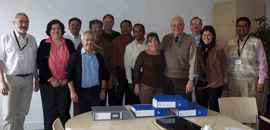Regulatory and prequalification pathways
MVP regulatory team preparing the regulatory dossier for submission to the Drugs Controller General of India. |
Clearing the final hurdles
Licensure and WHO prequalification of MenAfriVac® for use in people aged 1 to 29 years
On 22 January 2010, following a review supported by Health Canada, the Drugs Controller General of India (DCGI)—the national authority that regulates market authorization of new biological medicinal products (including vaccines) developed in India—granted Serum Institute of India Ltd (SIIL) marketing authorization to export MenAfriVac® for use in 1- to 29-year-olds in Africa.
The DCGI decision came after six to nine months of extensive review of the 2-part, 13,000-page regulatory dossier that had been submitted by SIIL. The first part of the dossier, submitted in April 2009, included nonclinical data, while the second part, submitted in July, contained data from Phase 1, Phase 2, and Phase 2/3 clinical studies conducted in India and Africa.
DCGI's approval of MenAfriVac® represented a significant step forward in supporting large-scale introduction of the vaccine in the 26 countries of the meningitis belt.
- First, it enabled SIIL to start producing the vaccine at large scale—more than 300 million doses will be needed to immunize the 1- to 29-year-old target population in the meningitis belt over the next 10 years.
- Second, it enabled SIIL to ship MenAfriVac® to Africa so that it could be prepositioned for the first mass vaccination campaigns in late 2010.
- Third, it enabled the World Health Organization (WHO) to launch its own evaluation procedure for vaccine prequalification—a process that could not start without the vaccine first being approved by the Indian national regulatory authority.
On 23 June 2010, after a detailed evaluation of the prequalification dossier, WHO announced prequalification of the vaccine, certifying that MenAfriVac® met international standards of quality, safety, and efficacy. With a vaccine in hand, African countries could start dreaming about a future without group A meningitis epidemics.
Licensure and WHO prequalification of MenAfriVac® for use in infants
In July 2014, SIIL submitted the MenAfriVac® pediatric license dossier both to the DCGI and to the WHO prequalification team—a major step toward marketing authorization and prequalification of MenAfriVac® for use in infants. The 16,000-page variation dossier included manufacturing data and clinical data from MVP’s two infant studies in Ghana and Mali.
As a rule, WHO reviews variation application dossiers only after the variation has been approved by national regulatory authorities in the country where the vaccine/product is manufactured (India). In this case, however, the threat posed by the accumulation of susceptible birth cohorts since the initial mass campaigns of 2010 warranted a different procedure—a so-called “fast-track approach”—to ensure that the pediatric vaccine could be introduced as quickly as possible in African routine immunization programs.
On 19 November 2014, Indian regulatory authorities approved use of the MenAfriVac® vaccine in children younger than one year of age.
On 30 December 2014, after a detailed evaluation of the vaccine license variation application, WHO approved use of MenAfriVac® in infants, certifying that the lower vaccine dosage (5µg) meets international standards of quality, safety, and efficacy.
Photo: Monique Berlier.

